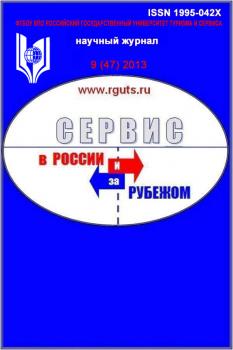Institute of Economics and Industrial Engineering Siberian Branch of the Russian Academy of Sciences
Novosibirsk State University of Economics and Management
Novosibirsk, Novosibirsk, Russian Federation
The article is devoted to the issues of improving the enterprise monitoring services in the context of its inclusion in the cluster structure. One of the most promising areas for increasing the activity of territories is the functioning of clusters in various sectors of the economy. Against the backdrop of the activity on their creation and state support, the issue of the significance of the control service regarding the work of enterprises as participants in clusters, in the economic literature is insufficiently disclosed. The problem of organizing an adequate internal control at the enterprise as part of the overall problem of the forming its effective appraisal and analytical system remains largely unresolved. The article is focused on the organization activity when forming integration cluster interactions, namely approaches and tools for modeling the function of the internal control service of an organization when joining a cluster. The purpose of the research is to test the possibility of modeling the process of qualitative expertise in the implementation of the cluster initiative and develop, on this basis, proposals for the organization of internal control of an enterprise as a participant in the cluster. This is supposed to be done through the business game "Internal Audit in a Cluster" based on the assignment of a conditional Board of Directors, where the task of forming an expert opinion on the need to implement measures for an enterprise as a member of a cluster should be decided for the internal audit unit. The authors offer an approach for monitoring the state of internal control based on the game method "traffic light". Game experiment allows to improve the expertise quality of proposals for participation in the cluster and to form the directions of work in the internal control system. The application of a business game with the participation of professional practitioners makes it possible to test a new management technology for identifying and assessing enterprise risks in cluster projects, to improve the quality of control as a service function for enterprise management bodies. The research results can be used by the participants of clusters created and planned to be created for building and improving their internal control system, conducting strategic sessions, developing cluster’s internal documents.
management, efficiency, control service, cluster, business game
1. Uskova T.V. Razvitie regional'nyh klasternyh sistem // Regional'naya ekonomika. 2008. №1(1). S. 93-104.
2. Pilipenko I.V. Klasternaya politika v Rossii: vozmozhnosti realizacii i konkurentosposobnost' regionov // VIII Sokraticheskie chteniya. Postindustrial'naya transformaciya staropromyshlennyh rayonov Rossii: Sb. dokladov. M.: Eslan, 2011. S. 177-211.
3. Markushina E.V. Klastery i klasternye strategii v razvitii ekonomiki regiona // Problemy sovremennoy ekonomiki. 2010. №2(34). S. 322-323.
4. Akinfeeva E.V. Formirovanie i razvitie regional'nyh klasterov // Al'manah «Nauka. Innovacii. Obrazovanie». 2008. Vyp. 7. C. 177-191.
5. Noskov-Dukel'skiy A.I. Klasternyy podhod v issledovanii sistem predpriyatiy sfery servisa // Servis v Rossii i za rubezhom. 2011. №6(25). S. 110-115.
6. Bulyarskiy S.V., Bulyarskaya S.V., Sinicyn A.O. Upravlenie promyshlennym klasterom // Vestnik OGU. 2012. №9(145). S. 70-74.
7. Bulanov A.Yu., Mezenceva O.V., Mezenceva A.V. Metodologicheskie aspekty upravleniya innovaciyami v infrastrukturnyh elementah promyshlennyh klasterov. M.: Strateg, 2010. 123 s.
8. Porter M.E. On Competition. Boston (MA): Harvard Business School Publ., 2008. 478 p.
9. Markov L.S. Teoretiko-metodologicheskie osnovy klasternogo podhoda. Novosibirsk: IEOPP SO RAN, 2015. 300 s.
10. Lyamzin O.L. Klasternye iniciativy kak sposob intensifikacii social'no-ekonomicheskogo razvitiya // Sovremennaya ekonomika i upravlenie: instituty, innovacii, tehnologii. Issledovanie otdel'nyh aspektov institucional'nogo i regional'nogo razvitiya: monografiya. Novosibirsk: Izd-vo NGTU, 2016. S. 191-212.
11. Lyamzin O.L. About analytical and structural aspects of the management system of organizations that implement the integration steps // Proceedings of SGEM conference on social sciences & arts: conf. proc., intern. multidisciplinary sci. conf., on social sciences & arts. Bulgaria, Albena, 1-9 Sept. 2014. Sofia: STEF92 Technology Ltd., 2014. Vol. 3. Pr. 3-8.
12. Vyzhitovich A.M. Metody kontrolya strategiy autsorsinga pri restrukturizacii predpriyatiy // Ekonomika i predprinimatel'stvo. 2015. №8-1(61-1). S. 531-537.
13. Vyzhitovich A.M. Upravlenie nalogovymi riskami pri realizacii strategiy autsorsinga predpriyatiyami v processe restrukturizacii // Vestnik Samarskogo gosudarstvennogo ekonomicheskogo universiteta. 2015. №8. S. 75-84.
14. Komarov V.F., Rechin V.D., Vyzhitovich A.M. Innovacionnaya strategiya predpriyatiya // EKO - Ekonomika i organizaciya promyshlennogo proizvodstva. 1996. №8. S. 37-52.
15. Komarov V.F. Upravlencheskie imitacionnye igry. Novosibirsk: Nauka, Sib. otdelenie, 1989. 272 s.





